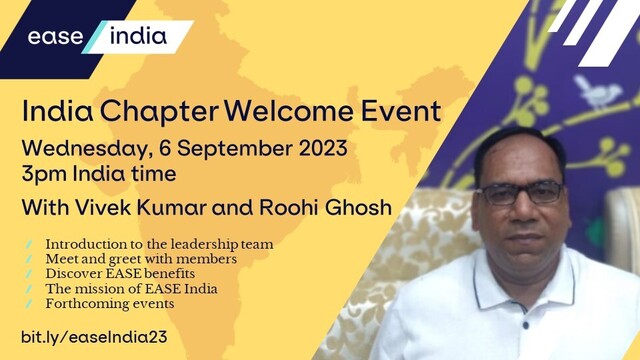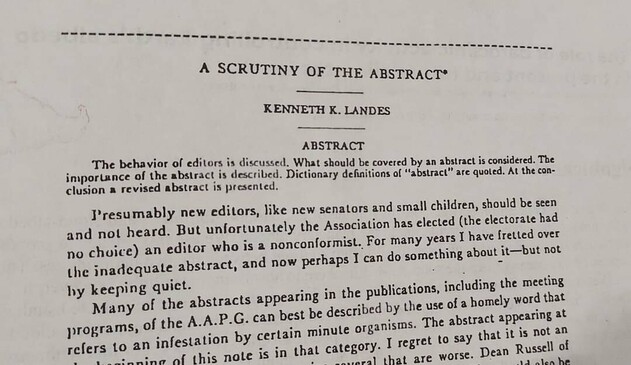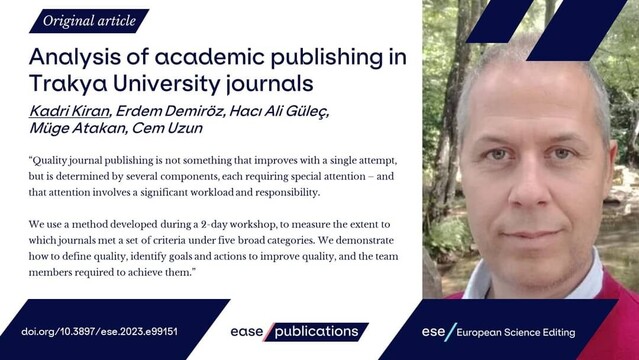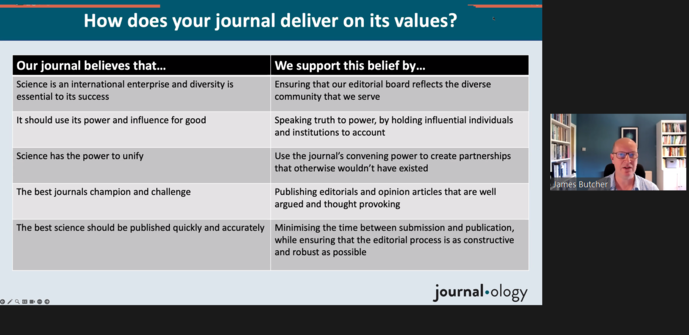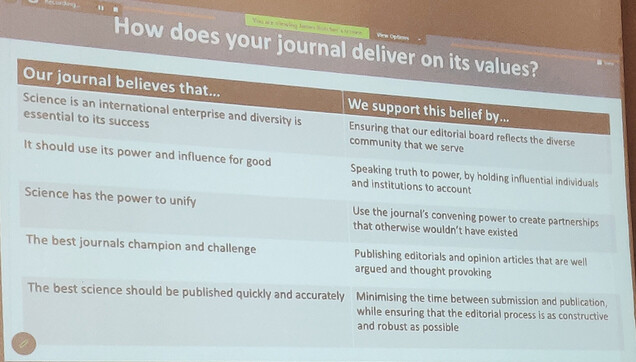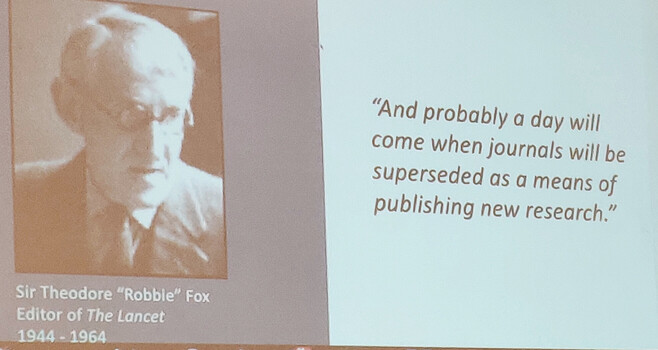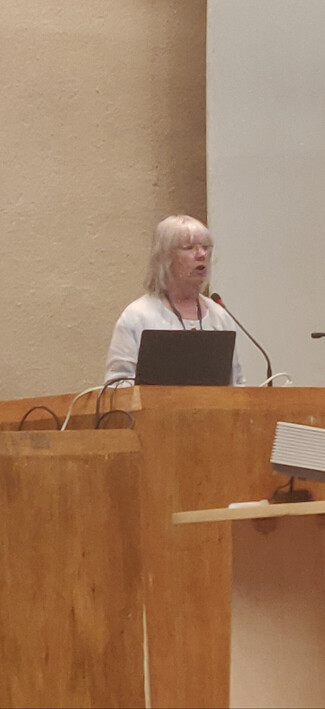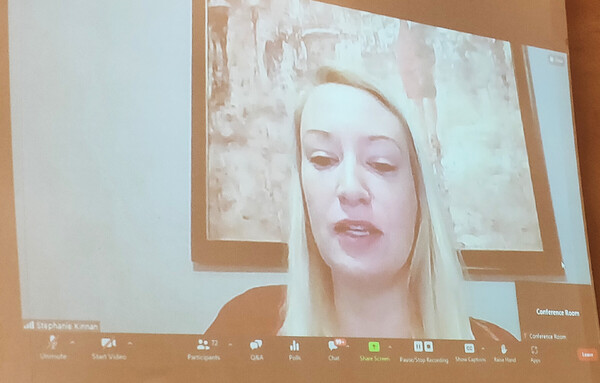EASE · @EASE
107 followers · 132 posts · Server mstdn.scienceOur India Chapter Welcome Event with Vivek Kumar and Roohi Ghosh is Wed 6 September 2023, 3pm India time. 🇮🇳
☑️ Introduction to the leadership team
☑️ Meet and greet with members
☑️ Discover EASE benefits
☑️ The mission of EASE India
☑️ Forthcoming events
Register: https://us02web.zoom.us/webinar/register/WN_uo7ErocSRi6EESiCm3MIVQ#/registration
EASE · @EASE
107 followers · 132 posts · Server mstdn.scienceThe new EASE Forum, exclusive to EASE members, is live!
Join in the chat in our general discussion, and with our special interest committees and Regional Chapters.
#JournalEditing #JournalPublishing #DiscussionsBoard #WebForum
#journalediting #JournalPublishing #discussionsboard #webforum
EASE · @EASE
77 followers · 114 posts · Server mstdn.scienceFrom the 1950s, this essay on uninformative abstracts is still relevant.
https://sepwww.stanford.edu/sep/prof/abscrut.html
(via Reviewer 2 Must Be Stopped! https://m.facebook.com/groups/reviewer2/permalink/10160418392140469/)
#ScienceWriting #Abstracts #WritingTips #JournalEditing #WontSomebodyThinkOfTheReaders
#sciencewriting #abstracts #writingtips #journalediting #wontsomebodythinkofthereaders
EASE · @EASE
77 followers · 114 posts · Server mstdn.scienceA new research article from members of our Turkish Chapter - including our new President, Prof Cem Uzun - reviews the status of 10 journals against a framework of international publishing standards and devises measures to enhance their quality, with a method which may help other journals do the same.
https://doi.org/10.3897/ese.2023.e99151
#JournalEditing #Turkey
Bahar · @bahar
181 followers · 358 posts · Server mstdn.socialAsk yourself what are your journal's core values and how you support them, suggests James Butcher of Journalology at @EASE #EASEEvents #JournalEditing #scholarlypublishing
#scholarlyPublishing #journalediting #easeevents
EASE · @EASE
72 followers · 94 posts · Server mstdn.scienceHomework for journal editors from James Butcher:
How does your journal deliver on its values?
EASE · @EASE
72 followers · 93 posts · Server mstdn.scienceWhat is the future of journals, asks James Butcher.
The demise of journals has been long predicted, but funders such as the Wellcome Trust are now disintermediating publishers using online platforms to directly post research.
What will be lost if journals disappear?
EASE · @EASE
72 followers · 92 posts · Server mstdn.scienceWhat are the core functions of journals, asks James Butcher:
1. Filter (rejection)
2. Enhance (revisions, copyediting)
3. Amplify (brand, press releases)
Leadership and advocacy also matter for many influential journals, such as #TheLancet where James worked. They have "convening power" to gather stakeholders and cross-pollinate ideas between disciplines.
Early signals of advances can be highlighted to readers, and authors can get recognition and visibility.
#thelancet #easeevents #journalediting
EASE · @EASE
68 followers · 58 posts · Server mstdn.scienceAre Brean of Tidsskriftet (Norwegian Medical Journal) notes that they mustn't just recruit white men aged over 50.
* Recruiting high quality people is expensive
* Recruiting low quality people is more expensive
A meeting should never be "just a meeting". It's an opportunity to learn.
The loneliness of the long-distance editor - make them feel part of the team, have physical meetings, have newsletters, a good culture: control is limiting, trust is empowering.
EASE · @EASE
67 followers · 55 posts · Server mstdn.scienceDeveloping a quality editorial board. Outgoing EASE past-president, @pippasmart, shows the levels of editors: wider family, the core team, and support staff.
Editors need to know #PublicationEthics, and be committed, collegiate, and confident. They should be objective but have a good network to promote the journal.
Core competencies of journal editors: https://doi.org/10.1186/s12916-017-0927-0
Problems: unaccountable, abuse of position, little or no training, low diversity.
#PublicationEthics #easeevents #journalediting
EASE · @EASE
67 followers · 54 posts · Server mstdn.science"Don't overuse virtual" says Stephanie Kinnan, fully aware of the irony of saying this on Zoom across the globe at a conference!
Meetings are disruptive to people's day and should only be held when needed. Email, online chat, or a phone call can be more effective.
#easeevents #journalediting #processoptimisation
EASE · @EASE
66 followers · 52 posts · Server mstdn.scienceStephanie Kinnan says onboarding a new journal team is a good time to reassess processes, but you need to manage expectations.
There may be limits to staff time and resources and so changes need to be prioritised. New article types are relatively easy, a revamped website much less so - is it worth it, what are you going to drop to free up those resources?
A transition is an opportunity to stop running unread reports or make processes more efficient.
#easeevents #journalediting #managingeditor
EASE · @EASE
66 followers · 51 posts · Server mstdn.scienceQuestion your editorial process: who will see the result of a task and is it needed any longer?
Check boxes at submission and acceptance might be unnecessary, deadlines for reviewers or authors may be too long, automated email reminders may help get tasks taken - but some email notifications of actions, especially internally, may be pointless.
Juanita has been quite "brutal" with cutting editorial steps.
#processoptimisation #easeevents #journalediting
EASE · @EASE
66 followers · 48 posts · Server mstdn.scienceRT @C0PE on 🐦
NEW GUIDANCE
Best practice for guest-edited collections.
- Find out more about what to consider when managing collections.
- Includes checklists for creating guest-edited collections.
https://doi.org/10.24318/7cKLAia0
#PublicationEthics #ScholComm #JournalEditing #CommitteeOnPublicationEthics
#PublicationEthics #scholcomm #journalediting #committeeonpublicationethics
EASE · @EASE
65 followers · 45 posts · Server mstdn.scienceAltmetrics such as article-level metrics can be useful, says George Vousden, because the Journal Impact Factor is not useful for individual article impact. However, #altmetrics attention such as on social media can be due to negative concerns about errors or integrity as well as scientific quality.
"Quality" can only really be judged qualitatively, but @PLOS is introducing #OpenScience indicators.
#altmetrics #openscience #easeevents #journalediting
EASE · @EASE
65 followers · 44 posts · Server mstdn.scienceShould editors set similarity thresholds? George Vousden cautions against this, because the number "can mean anything". A long article can have the whole introduction plagiarised, but a low overall similarity index.
#easeevents #journalediting #plagiarism
EASE · @EASE
65 followers · 43 posts · Server mstdn.scienceDifferent #PeerReview models are accepted by different communities, notes Joe Krumpfer. It needs to be tailored to each field.
Ilana Kolodkin thinks double anonymisation is a great idea, but it's hard for authors because you need to detach it from your previous work.
p.s. @bahar notes to use "double anonymisation" vs "double blind" terminology.
#peerreview #easeevents #journalediting
EASE · @EASE
65 followers · 42 posts · Server mstdn.scienceAre structured #PeerReview forms useful?
Guidelines online are often not read, agree Joe Krumpfer and George Vousden. However, George says he wants every review to discuss methods and so structured questions are helpful.
Ilana Kolodkin finds structured forms really annoying, because she has carefully prepared a coherent review and needs to break it up.
George notes you shouldn't use scales for "impact": prose is better to guide editors, if they use that criterion.
#peerreview #easeevents #journalediting
EASE · @EASE
65 followers · 41 posts · Server mstdn.scienceWe shouldn't assume peer reviewers haven't seen a submission before, says Ilana Kolodkin. They usually have submitted and revised a couple of times already.
Joe Krumpfer notes that a reviewer saying "I reviewed this before and recommended rejection" is unhelpful, because the journal criteria may be different.
#easeevents #peerreview #journalediting
EASE · @EASE
65 followers · 40 posts · Server mstdn.scienceWhat's a good #PeerReview for an author? Ilana Kolodkin says short, positive reviews aren't given as much weight as long, negative reviews, which can be unfortunate. She prefers careful review over speed, even as an author.
George Vousden says reviewer training is variable and to avoid a focus on language you need clear guidelines. Reports should be constructive and guide the authors. If they're positive, the reviewer should outline how the article is suitable.
#peerreview #easeevents #journalediting
